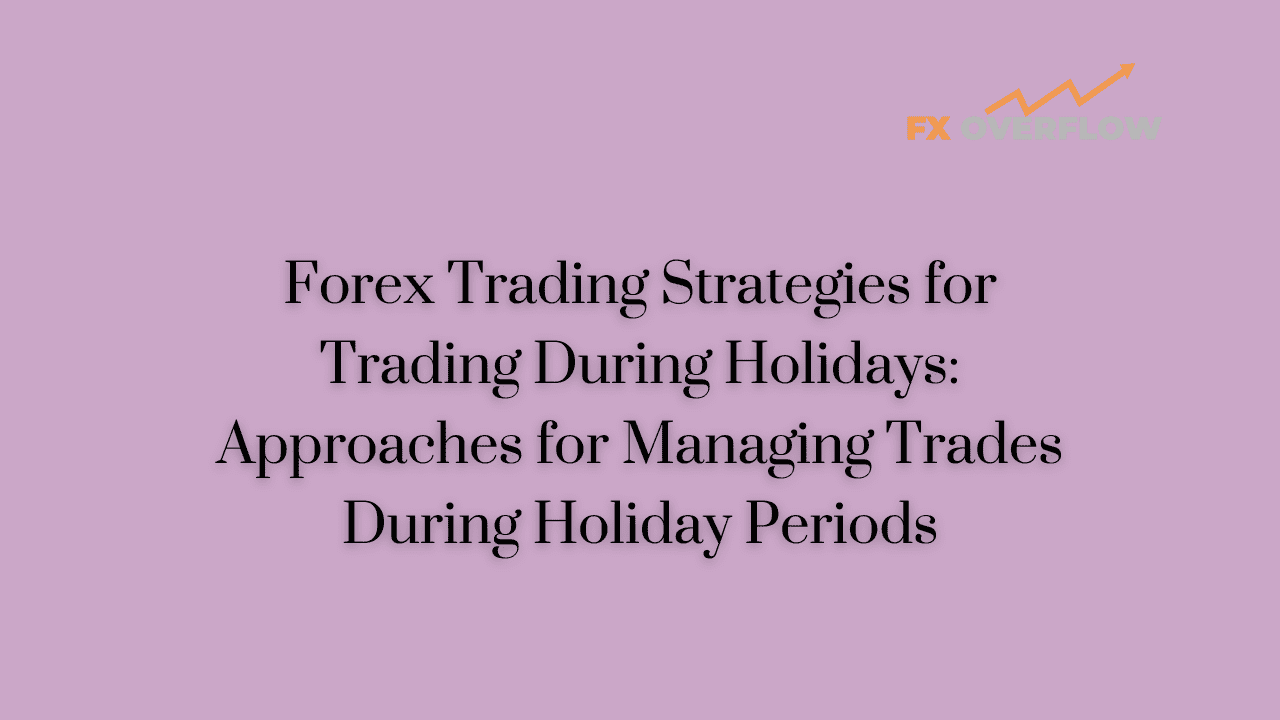Forex Trading Strategies for Trading During Holidays: Approaches for Managing Trades During Holiday Periods
Forex trading during holiday periods introduces unique challenges and opportunities. This article delves into effective strategies that traders can adopt to navigate the volatile markets during such times. By adjusting risk management techniques, identifying key trading sessions, and utilizing technical and fundamental analysis, traders can enhance their success and make the most of holiday trading.

Table content
1. Introduction
2. Understanding the Holiday Market Dynamics
3. Adjusting Risk Management Techniques
4. Identifying Key Trading Sessions
5. Utilizing Technical and Fundamental Analysis
6. Implementing Short-Term Strategies
7. FAQs
8. Footnote
Introduction:
Forex trading is a dynamic endeavor, influenced by a plethora of factors ranging from economic indicators to geopolitical events. However, the holiday season adds another layer of complexity to the trading landscape. Reduced liquidity, unpredictable price movements, and altered trading schedules are common occurrences during holidays. In this article, we will explore various strategies that traders can employ to manage their trades successfully during holiday periods. By understanding the market dynamics and adapting their approaches, traders can capitalize on potential gains while minimizing risks.
Understanding the Holiday Market Dynamics:
The holiday season is marked by a significant reduction in market participants due to vacations and festivities. This leads to reduced liquidity, which, in turn, can result in sudden and unpredictable price movements. The absence of major players can amplify market volatility, leading to potentially lucrative trading opportunities. Moreover, geopolitical events that occur during holidays can exert an additional impact on currency markets, driving sudden fluctuations.
Adjusting Risk Management Techniques:
Risk management is paramount in forex trading, and its significance becomes even more pronounced during holidays. Traders should adjust their risk management techniques to account for the increased volatility. This includes reducing position sizes to limit exposure and tightening stop-loss orders to guard against abrupt price swings. Utilizing appropriate leverage is also crucial to prevent overexposure to potential losses.
Identifying Key Trading Sessions:
Despite the holiday-induced market irregularities, there are still key trading sessions that offer higher liquidity and volatility. These active sessions can provide traders with more favorable trading conditions. For example, when the London and New York markets overlap, there is a surge in trading activity and liquidity. Traders should focus on these sessions to capitalize on potential opportunities while remaining cautious during less active periods.
Utilizing Technical and Fundamental Analysis:
Technical analysis remains a valuable tool during holiday trading. Traders can adapt their technical strategies to incorporate indicators that perform well in volatile conditions. Moreover, fundamental analysis shouldn't be disregarded. Staying informed about potential news releases, economic data, and geopolitical developments can help traders anticipate and navigate market shifts during the holiday season.
Implementing Short-Term Strategies:
Short-term trading strategies, such as day trading and scalping, can be particularly effective during holiday periods. The increased volatility offers more frequent trading opportunities, allowing traders to profit from quick price movements. However, discipline is crucial. Overtrading should be avoided, and strategies should be adapted to the unique
conditions of holiday trading to prevent unnecessary risks.
FAQs:
Q1: Why are holiday periods challenging for forex traders?
A: Holiday periods see reduced market liquidity due to participants taking time off. This can lead to erratic price movements and increased volatility, making trading more unpredictable and challenging.
Q2: How can traders manage risks during holiday trading?
A: Traders can manage risks by adjusting their risk management techniques. This includes reducing position sizes, tightening stop-loss orders, and using appropriate leverage to safeguard against sudden price swings and potential losses.
Q3: Are there specific trading sessions that are better for holiday trading?
A: Yes, certain trading sessions overlap during holiday periods, resulting in higher liquidity and volatility. These active sessions, such as when the London and New York markets coincide, offer better trading opportunities.
Q4: Does fundamental analysis matter during holiday trading?
A: Yes, fundamental analysis remains important during holiday trading. Traders should stay informed about potential news releases and geopolitical events that could impact the currency markets. This helps them make informed trading decisions.
Q5: Can short-term trading strategies work during holidays?
A: Short-term trading strategies like day trading and scalping can be effective during holidays due to increased volatility. However, traders should exercise discipline, avoid overtrading, and adapt their strategies to suit the unique conditions of holiday trading.
Footnote:
Trading forex during holiday periods requires a strategic approach that considers the unique challenges and opportunities presented by reduced liquidity and increased volatility. By understanding the holiday market dynamics, adjusting risk management techniques, identifying key trading sessions, and incorporating both technical and fundamental analysis, traders can position themselves for success. As the trading landscape evolves during holidays, traders who are well-prepared and adaptable stand to benefit from the potential gains while mitigating the associated risks. Remember, the key to thriving in holiday trading lies in a combination of knowledge, discipline, and a keen understanding of market behavior.











Discussion